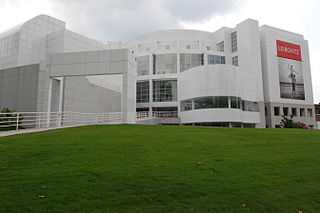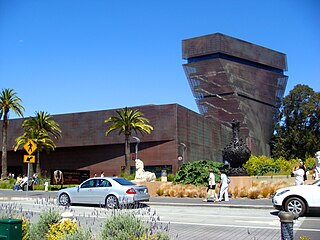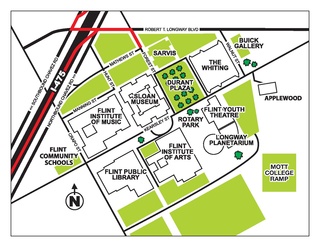
The National Gallery of Art is an art museum in Washington, D.C., United States, located on the National Mall, between 3rd and 9th Streets, at Constitution Avenue NW. Open to the public and free of charge, the museum was privately established in 1937 for the American people by a joint resolution of the United States Congress. Andrew W. Mellon donated a substantial art collection and funds for construction. The core collection includes major works of art donated by Paul Mellon, Ailsa Mellon Bruce, Lessing J. Rosenwald, Samuel Henry Kress, Rush Harrison Kress, Peter Arrell Browne Widener, Joseph E. Widener, and Chester Dale. The Gallery's collection of paintings, drawings, prints, photographs, sculpture, medals, and decorative arts traces the development of Western art from the Middle Ages to the present, including the only painting by Leonardo da Vinci in the Americas and the largest mobile created by Alexander Calder.

The Smithsonian American Art Museum is a museum in Washington, D.C., part of the Smithsonian Institution. Together with its branch museum, the Renwick Gallery, SAAM holds one of the world's largest and most inclusive collections of art, from the colonial period to the present, made in the United States. More than 7,000 artists are represented in the museum's collection. Most exhibitions are held in the museum's main building, the Old Patent Office Building, while craft-focused exhibitions are shown in the Renwick Gallery.

The Carnegie Museum of Art is an art museum in the Oakland neighborhood of Pittsburgh, Pennsylvania. The museum was originally known as the Department of Fine Arts, Carnegie Institute and was formerly located at what is now the Main Branch of the Carnegie Library of Pittsburgh. The museum's first gallery was opened for public use on November 5, 1895. Over the years, the gallery vastly increased in size, with a new building on Forbes Avenue built in 1907. In 1963, the name was officially changed to Museum of Art, Carnegie Institute. The size of the gallery has tripled over time, and it was officially renamed in 1986 to "Carnegie Museum of Art" to indicate it clearly as one of the four Carnegie Museums.

The High Museum of Art is the largest museum for visual art in the Southeastern United States. Located in Atlanta, Georgia, the High is 312,000 square feet and a division of the Woodruff Arts Center.

Frederick Carl Frieseke was an American Impressionist painter who spent most of his life as an expatriate in France. An influential member of the Giverny art colony, his paintings often concentrated on various effects of dappled sunlight.

The Dallas Museum of Art (DMA) is an art museum located in the Arts District of downtown Dallas, Texas, along Woodall Rodgers Freeway between St. Paul and Harwood. In the 1970s, the museum moved from its previous location in Fair Park to the Arts District. The new building was designed by Edward Larrabee Barnes and John MY Lee Associates, the 2007 winner of the American Institute of Architects Gold Medal. The construction of the building spanned in stages over a decade.

The Minneapolis Institute of Art (Mia) is an arts museum located in Minneapolis, Minnesota, United States. Home to more than 90,000 works of art representing 5,000 years of world history, Mia is one of the largest art museums in the United States. Its permanent collection spans about 20,000 years and represents the world's diverse cultures across six continents. The museum has seven curatorial areas: Arts of Africa & the Americas; Contemporary Art; Decorative Arts, Textiles & Sculpture; Asian Art; Paintings; Photography and New Media; and Prints and Drawings.

The Mobile Museum of Art (MMofA) is an art museum located in Mobile, Alabama. It features extensive art collections from the United States, Europe, and non-western art. The museum hosts exhibitions, multi-disciplinary programs (including film, poetry, and dance), and studio art classes for all ages.

The de Young Museum, formally the M. H. de Young Memorial Museum, is a fine arts museum located in San Francisco, California. Located in Golden Gate Park, it is a component of the Fine Arts Museums of San Francisco, along with the Legion of Honor. The de Young is named for early San Francisco newspaperman M. H. de Young.

The Virginia Museum of Fine Arts (VMFA) is an art museum in Richmond, Virginia, United States, which opened in 1936. The museum is owned and operated by the Commonwealth of Virginia. Private donations, endowments, and funds are used for the support of specific programs and all acquisition of artwork, as well as additional general support.

Crystal Bridges Museum of American Art is a museum of American art in Bentonville, Arkansas. The museum, founded by Alice Walton and designed by Moshe Safdie, officially opened on 11 November 2011. It offers free public admission.

The Flint Cultural Center (FCC) is a campus of cultural, scientific, and artistic institutes located in Flint, Michigan, United States. The institutions located on the grounds of the FCC are the Flint Institute of Arts, Flint Institute of Music, Sloan Museum, Flint Public Library, Buick Gallery & Research Center, Robert T. Longway Planetarium, The Whiting, and the Bower Theatre. The campus and some institutions are owned by Flint Cultural Center Corporation.

The Museum of Fine Arts, Houston (MFAH), is an art museum located in the Houston Museum District of Houston, Texas. With the recent completion of an eight-year campus redevelopment project, including the opening of the Nancy and Rich Kinder Building in 2020, it is the 12th largest art museum in the world based on square feet of gallery space. The permanent collection of the museum spans more than 6,000 years of history with approximately 70,000 works from six continents. In 2023, the museum received over 900,000 visitors, making it the 20th most-visited museum in the United States.

The New Orleans Museum of Art is the oldest fine arts museum in the city of New Orleans. It is situated within City Park, a short distance from the intersection of Carrollton Avenue and Esplanade Avenue, and near the terminus of the "Canal Street - City Park" streetcar line. It was established in 1911 as the Delgado Museum of Art.

The Art Institute of Chicago, founded in 1879, is one of the oldest and largest art museums in the United States. It is based in the Art Institute of Chicago Building in Chicago's Grant Park. Its collection, stewarded by 11 curatorial departments, includes works such as Georges Seurat's A Sunday on La Grande Jatte, Pablo Picasso's The Old Guitarist, Edward Hopper's Nighthawks, and Grant Wood's American Gothic. Its permanent collection of nearly 300,000 works of art is augmented by more than 30 special exhibitions mounted yearly that illuminate aspects of the collection and present curatorial and scientific research.

The Kalamazoo Institute of Arts (KIA) is a non-profit art museum and school in downtown Kalamazoo, Michigan, United States.

Memphis Brooks Museum of Art is an art museum in Memphis, Tennessee. The Brooks Museum, which was founded in 1916, is the oldest and largest art museum in the state of Tennessee. The museum is a privately funded nonprofit institution located in Overton Park in Midtown Memphis.

The Montgomery Museum of Fine Arts is a museum located in Montgomery, Alabama, USA, featuring several art collections. The permanent collection includes examples of 19th- and 20th-century American paintings and sculpture, Southern regional art, Old Master prints and decorative arts. It is also home to Artworks, a participatory art gallery and studio for children.

Jennie C. Jones is an African-American artist living and working in Brooklyn, New York. Her work has been described, by Ken Johnson, as evoking minimalism, and paying tribute to the cross-pollination of different genres of music, especially jazz. As an artist, she connects most of her work between art and sound. Such connections are made with multiple mediums, from paintings to sculptures and paper to audio collages. In 2012, Jones was the recipient of the Joyce Alexander Wien Prize, one of the biggest awards given to an individual artist in the United States. The prize honors one African-American artist who has proven their commitment to innovation and creativity, with an award of 50,000 dollars. In December 2015 a 10-year survey of Jones's work, titled Compilation, opened at the Contemporary Arts Museum in Houston, Texas.
Allie McGhee is a Detroit-based African American painter and pillar of the Detroit art community since the 1960s. Allie McGhee attended Cass Technical High School in Detroit, MI, and completed his undergraduate work at Eastern Michigan University in 1965.




















